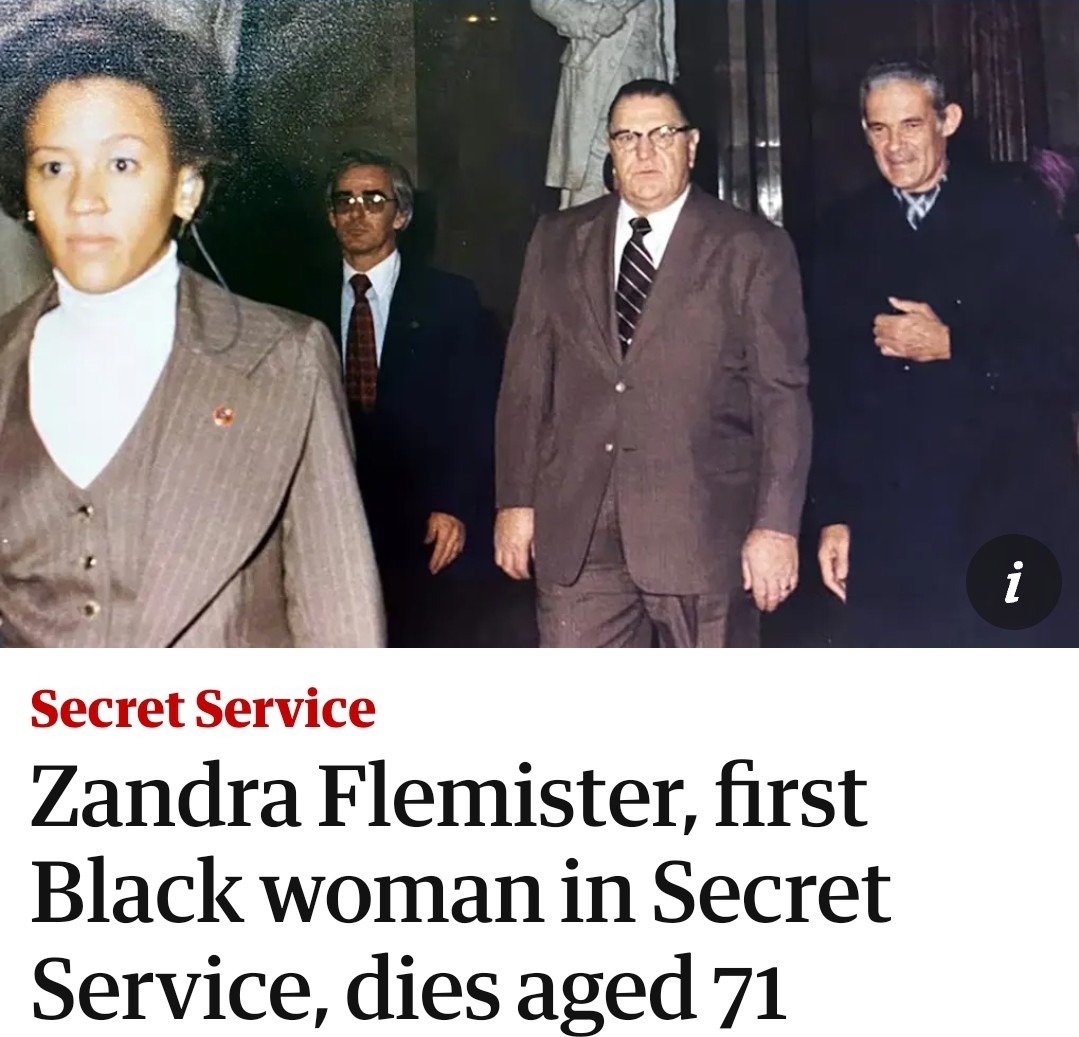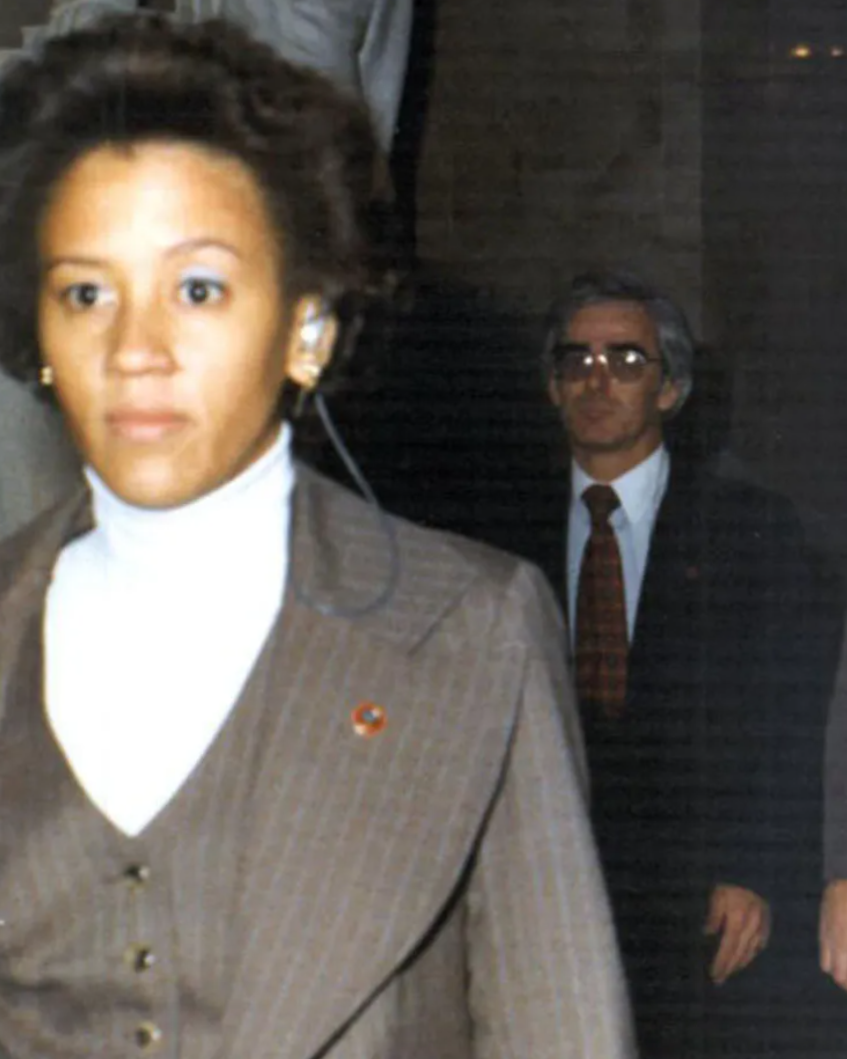Zandra Flemister, the first Black woman to serve as a special agent in the U.S. Secret Service, died last week at age 71. She is being remembered as a pioneer at the agency, which she left after four years because of racial discrimination.
She went on to spend over three decades as a foreign service officer, rising to the upper ranks of senior foreign service before Alzheimer’s disease forced her to retire in 2011. She did so while juggling family responsibilities, including raising her son, who was diagnosed with autism as a child.
“The level of accomplishments that my wife managed … under the conditions that she lived, that to me says a hell of a lot about the woman,” Flemister’s husband, John Collinge, told NPR in a phone interview.

Flemister’s death — of Alzheimer’s complications and publicized in a Washington Post obituary — has renewed attention to her trailblazing stint at the Secret Service in the 1970s.
“I’ve gotten an incredible outpouring from Black women Secret Service agents past and present, and they are looking to her now as, I guess I would say, a forgotten pioneer who has been rescued from oblivion,” Collinge said, of the emails and calls he has gotten in recent days.
Flemister wasn’t aware of the historic nature of her own role until she started in August of 1974, a week before President Richard Nixon’s resignation, according to Collinge.
And she experienced discrimination and tokenization throughout her time at the agency, including being relegated to mostly undercover and lower-paying duties, getting propositioned by male colleagues on overnight assignments, being denied recognition for exemplary work and facing a constant barrage of racist comments and slurs, often aimed at her directly.
Flemister stayed with the agency because she wanted to be a “trailblazer for other African-American women,” as she wrote in an affidavit filed in support of a 2000 class-action lawsuit alleging racial discrimination within the Secret Service (which settled for $24 million in 2017).

But she was forced to change course, ultimately taking a new job — and a pay cut — at the State Department in 1978, launching an adventure-packed career in the foreign service.
Her three decades of experience there included “running interagency visa screening programs in Pakistan and South Korea, establishing a multinational anti-visa fraud working group in London, and extensive counter-narcotics experience in Pakistan and the department,” as Collinge wrote in a 2016 Foreign Service Journal article detailing her journey with dementia.
Flemister had a reputation for being “absolutely unflappable in a crisis” and able to “quietly tutor people without humiliating them,” Collinge said. She was respected for her deep understanding of consular law and willingness to take on difficult jobs.
Collinge, himself a retired CIA officer, described Flemister as a “classic New Englander” — very introverted and reserved, especially when it came to her career.

“She learned very, very early on that she had to carry herself very carefully as a professional Black woman,” he said. “There was always reserve and care in how she presented herself professionally.”
But he also remembers her love of travel — whether to D.C.-area beaches or European cities during her embassy assignments — and her dry sense of humor.
“Zandra and I had a little routine between ourselves where I would turn to her and say ‘You can be replaced,’ and she would turn to me and say ‘But not easily,’ ” Collinge recalled. “Now that is the absolute truth, and I sure learned that after she slipped into her dementia.”
The highs and lows of Flemister’s Secret Service years
Flemister was born in Frankfurt to a U.S. Army sergeant and government microfilm technician, and spent the first four or five years of her life in Germany and France before her parents separated and she moved with her mom to Connecticut.
She went to Northeastern University on a work-study program, graduating with a degree in political science. Flemister would later recall that “it was government service for which I had prepared, and to government service I was destined to go,” according to the Post.
After a yearlong stint working as a department store buyer, Flemister met a Secret Service recruiter at a job fair who told her she was overqualified for the uniformed service and encouraged her to apply to be a special agent instead.
She got the job, packed everything she could fit into her AMC Hornet and headed down to the Washington Field Office in August 1974.
“That was the point at which she discovered she was a racial pioneer,” Collinge said. “No one said anything to her. I do not believe there was any preparation for her as a racial pioneer and there certainly was no effort to provide her with any level of support.”
Flemister was mostly assigned to undercover, counterfeit and treasury fraud work, though did work some notable protective details — including for Bob Dole’s wife Elizabeth while he was running for vice president and first daughters Susan Ford and Amy Carter (discreetly accompanying them to dates and elementary school classes, respectively).
Collinge said she was a particular favorite of Lady Bird Johnson, who had lifetime Secret Service protection as a former first lady and would specifically request that Flemister come with her on her regular visits to see “critters” at the National Zoo (though she later wrote that those duties pulled her away from other work that would have advanced her career).
Flemister also picked up special skills like skiing (to join President Gerald Ford on his ski trips to Colorado) and handling a variety of weapons in order to qualify on a shooting range each month.
But she struggled to be taken seriously by her colleagues and supervisors on a daily basis and felt she wouldn’t be able to advance at the agency in the long term.
At one point, a superior told her that she’d have to get rid of her Afro-style hairdo in order to get assigned to more prestigious and lucrative security details. Flemister did, but later wrote that she felt like “the show African-American female agent that the Secret Service rotated around to different details to make it appear racially diverse.”

One colleague taped an image of a gorilla over Flemister’s photo on her ID card, while another gestured to her in the office and asked “Whose prisoner is she?” Flemister said that on presidential visits to Senegal and Grenada, she heard white agents refer to the leaders of those countries using the n-word, and wasn’t aware of any action being taken after she reported it.
“With my requests for transfers to career-enhancing squads consistently denied, my credibility and competency constantly questioned, and the common use of racial epithets in my presence, I saw the handwriting on the wall,” Flemister wrote, according to a copy of the affidavit shared with NPR. “Because of my race I would never be allowed to have a successful career in the Secret Service.”
Collinge said Flemister was “so disgusted at the persistence of the racism she had encountered” that she volunteered to submit an affidavit in early 2001, though was not personally a plaintiff in the lawsuit (it was limited to current officers) and was deep in the throes of dementia by the time it was settled.
He isn’t sure how long Flemister had initially planned to stay in the Secret Service, but described the foreign service as “her true passion.”
The two were in the same entering class, and after they started dating (with a long-distance romance including 18 months of letter-writing from their foreign postings) she told him about her time at the Secret Service. She said she knew within her first year on the job that she would have been stuck doing the same type of work for the next 20.
“I would be a shriveled-up, bitter husk and I did not want that,” he recalls her saying.

Honoring Flemister and the legacy she leaves behind
In statements issued after Flemister’s death, the Secret Service honored her as a trailblazer who paved the way for a future generation of agents — and stressed that the agency’s culture has changed for the better in the decades since.
“As it relates to the adversity and hardships that Special Agent Flemister encountered in the 1970’s, that agency no longer exists,” communications chief Anthony Guglielmi told NPR over email.
He said its status as the global leader in protective operations and safeguarding the U.S. financial system “is in large part due to Special Agent Flemister and the agents who followed in her footsteps to create a collaborative workforce that is valued for their professional and cultural diversity and experiences.”
One of the agents who followed — albeit unknowingly — in Flemister’s footsteps was former Secret Service Assistant Director Renee Triplett.
Triplett arrived at the Washington Field Office in 1989 and retired in 2016 as the first Black woman to serve in that executive-level position, which oversees human resources and personnel security management.







